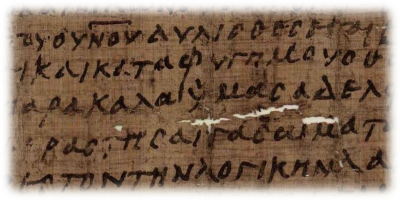Historically, the purpose of a translation was to bring the Bible to those who did not read the original language. Over the centuries there has been a shift in purpose.
Consumerism in the Bible Business
In December of 2006 "The New Yorker" published the article "The Good Book Business" which stated; "The familiar observation that the Bible is the best-selling book of all time obscures a more startling fact: the Bible is the best-selling book of the year, every year… This is an intensely competitive business… Every year, Nelson Bible executives analyze their product line for shortcomings, scrutinize the competition's offerings, and talk with consumers, retailers, and pastors about their needs."
In short, the translating and printing of Bibles is "Big Business." In the world of consumerism, it is the producer's primary objective to offer a product that appeal to the consumer. For this reason a translation is required to conform to the buyer's expectations. If a Bible is published that does not conform to the buyers expectations, even if it is more accurate, it will not sell. For this reason, we must be willing to do our own investigations into the meaning and interpretation of the text.
The Original Language
Many theological discussions, teachings and debates use phrases like "The Bible says," or "God says." From a technical point of view, the problem with these statements is that it assumes the Bible was written in English, which of course we all know is not true.
The Bible does not say, "In the beginning God created the heavens and the earth." A more accurate statement would be, "The Bible says, בראשית ברא אלהים את השמים ואת הארץ (bereshiyt bara elohiym et hashamayim v'et ha'arets), which is often translated and interpreted as, In the beginning God created the heavens and the earth."
While this may sound trivial, it is in fact a very important issue as many theological differences, divisions and arguments are based on faulty interpretations of the text that could easily be resolved by examining the original language of the Bible. Once the Hebrew text is recognized, its meanings and interpretations can then be discussed properly.
As one example, the Hebrew word ראשית (reshiyt, Strong's #7225)) is translated as "beginning" in Genesis 1:1 in the King James Version. But the King James Version also translates this same Hebrew word as "chief" (1 Samuel 15:21) and "principle thing" (Proverbs 4:7). The Hebrew word ראשית (reshiyt) may be interpreted as "beginning," but it's more literal meaning is "height," as in the height or beginning of an event, the height of someone in rank or the height of importance.
Rather than attempting an interpretation from the English, one should at the least be attempting to understand the text from its Hebraic origin. This can be achieved through the use of an English Bible and a Concordance, where the student is able to find the Hebrew word used in the text that lies behind the English. When using this tool, it quickly becomes evident that the English translators of the text were not very consistent in how they translated Hebrew words.
For instance, the Hebrew word נפש (nephesh, Strong's #5315) is usually translated in the KJV as soul, but also as; appetite, beast, body, breath, creature, dead, desire, ghost, heart, life, lust, man, mind, person, pleasure, self, thing and will.
The Hebrew verb נתן (N-T-N, Strong's #5414) means "to give" but is also translated with a wide variety of English words including; add, aloud, apply, appoint, ascribe, assign, avenge, bestow, bring, cast, cause, charge, come, commit, consider, count, cry, deliver, direct, distribute, do, fasten, forth, frame, get, grant, hang, have, heal, heed, lay, leave, left, lend, let, lift, make, occupy, offer, ordain, over, oversight, pay, perform, place, plant, pour, present, print, pull, put, recompense, requite, restore, send, set, shoot, show, sing, sit, slander, strike, submit, suffer, take, thrust, tie, trade, turn, utter, weep, willingly, withdrew, would, yell, and yield.
While it is true that one English word cannot translate one Hebrew word perfectly and some translational liberties are necessary, this should only be done out of necessity and the change should be noted in a footnote to aid the student with proper understanding and interpretation.
The Inadequacy of a translation
The English vocabulary and its definitions are very inadequate in conveying the meanings of Hebrew words. In the following passages, from the KJV, we find the word "teach," an English word meaning "to impart knowledge or skill through instruction."
Exodus 18:20; And thou shalt teach them ordinances and laws, and shalt shew them the way wherein they must walk, and the work that they must do.
Exodus 24:12; And the LORD said unto Moses, Come up to me into the mount, and be there: and I will give thee tables of stone, and a law, and commandments which I have written; that thou mayest teach them.
Deuteronomy 4:1; Now therefore hearken, O Israel, unto the statutes and unto the judgments, which I teach you, for to do them, that ye may live, and go in and possess the land which the LORD God of your fathers giveth you.
Deuteronomy 4:9; Only take heed to thyself, and keep thy soul diligently, lest thou forget the things which thine eyes have seen, and lest they depart from thy heart all the days of thy life: but teach them thy sons, and thy sons' sons;
Deuteronomy 6:7; And thou shalt teach them diligently unto thy children, and shalt talk of them when thou sittest in thine house, and when thou walkest by the way, and when thou liest down, and when thou risest up.
Job 33:33; If not, hearken unto me: hold thy peace, and I shall teach thee wisdom.
Each use of the word "teach" in these six passages is the English translation of six different Hebrew words, each with its own unique meaning.
Exodus 24:12; ירה (yarah, Strong's #3384) – To point out the direction to go
Exodus 18:20; זהר (2094 (zahar, Strong's #2094) – To advise caution
Deuteronomy 4:1; למד (lamad, Strong's #3925) – To urge to go in a specific direction
Deuteronomy 4:9; ידע (yada, Strong's #3045) – To provide experience
Deuteronomy 6:7; שנן (shanan, Strong's #8150) – To sharpen
Job 33:33; אלף (alaph, Strong's #502) – To show through example
The original meaning of these six Hebrew words are completely erased and lost when they are simply translated as "teach," demonstrating the need of going beyond the simple translations.

English Bible (Photograph courtesy of David Ball)
When you open your Bible, recognize that it has a long and complicated history. Do we all need to be Hebrew and Greek scholars in order to read and interpret the Bible correctly? Absolutely Not. However, as I hope we have demonstrated, some independent study is required in order to read and understand the text according to the culture and philosophy of the original authors. The good news is that there are many great resources available to us today that will help in that education.

Like what you’re discovering? Continue the journey from Bible reader to translator.
|






